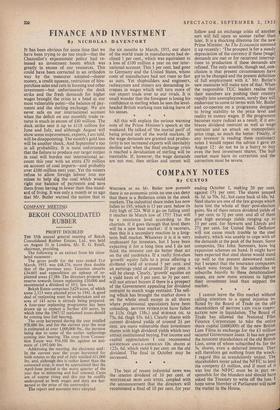FINANCE AND INVESTMENT
By NICHOLAS
DAVENPORT
IT has been obvious for some time that we have been trying to do too much—that the Chancellor's expansionist policy had re- leased an investment boom which was greatly in excess of our resources. This could have been corrected in an orthodox way by the measures adopted—dearer money, a credit squeeze, restriction of hire- purchase sales and cuts in housing and other investment—but unfortunately the dock strike and the fresh demands for higher wages brought the crisis to a head at our most vulnerable point—the balance of pay- ments and the sterling exchange. We are never safe on our international account when the deficit on our monthly trade re- turns is much in excess of £40 million. The dock strike sent it up to £118 million for June and July, and although August will show some improvement, exports, I am told, will be disappointing. The month's gold loss will be another shock. And September's too in all probability. It is most unfortunate that the failure to produce our target output in coal will burden our international ac- count this year with an extra £70 million on account of coal imports—and probably over £100 million next year. Yet the miners refuse to allow foreign labour into our mines to help dig the coal which would right our balance of payments and save them from having to lower their fine stand- ard of living. It was only a month or so ago that Mr. Butler warned the nation that in
the six months to March, 1955, our share of the world trade in manufactures had de- clined 1 per cent., which was equivalent to a loss of £100 million a year on our inter- national account. This 1 per cent, had gone to Germany and the United States, whose costs of manufacture had not risen so fast as ours. Yet shipbuilders and engineers, railwaymen and miners are demanding in- creases in wages which will turn more of our export trade over to our rivals. It is small wonder that the foreigner is losing his confidence in sterling when he sees the level- headed British working man taking leave of his senses.
All this will explain the serious warning note of the Prime Minister's speech at the weekend. He talked of 'the mortal peril' of being priced out of the world markets. If the wage demands are granted and produc- tivity is not increased exports will inevitably decline and when the final exchange crisis is reached a devaluation of sterling will be inevitable. If, however, the wage demands are not met, then strikes and unrest will
follow and an exchange crisis of another sort will fall upon us sooner rather than later. It is a shocking dilemma for the new Prime Minister. As 7'he Economist summed it up recently : 'The prospect is for a steady depreciation of the currency if these [wage] demands are met or for recurrent interrup- tions to production if these demands are refused. The only sensible, though sad, con- clusion is that present circumstances have got to be changed and the present definition of full employment with it.' Mr. Butler's new measures will make sure of that. When the responsible TUC leaders realise that their members are pushing their country rapidly into unemployment, surely they will endeavour to come to terms with Mr. Butler and co-operate on a programme designed to bring stability to the price level and reality to money wages. lithe programme becomes more radical as a result, if it em- braces dividend restraint as well as wage restraint and an attack on monopolistic price rings, so much the better. Finally, if any investor is reading these cautionary notes I would repeat the advice I gave on August 12: do not be in a hurry to buy even the best investment shares. The bull market must have its correction and the correction must be severe.


































 Previous page
Previous page